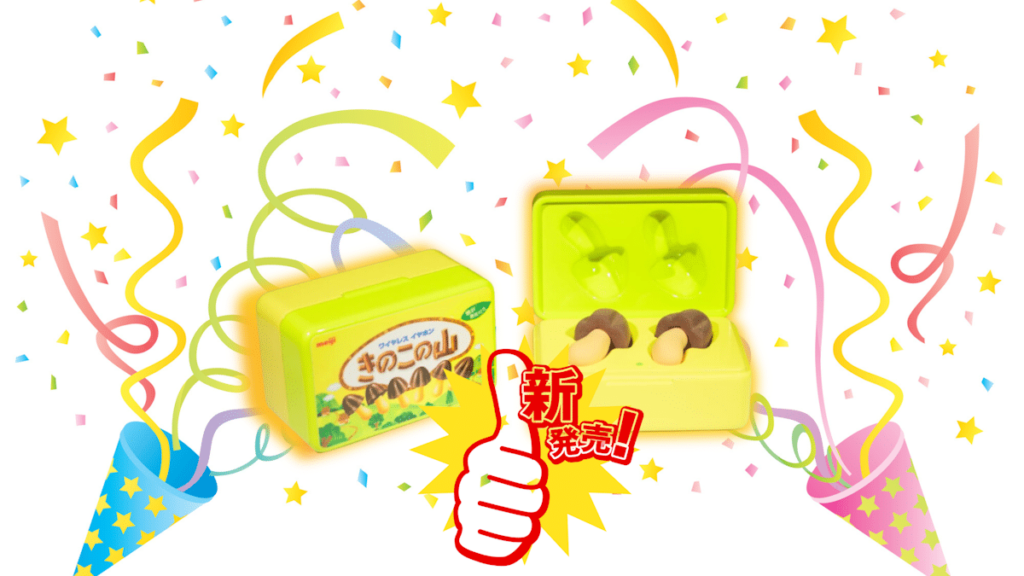[ad_1]
Ever see a snack and thought to yourself, “I can see myself wearing that”? If so, then the latest product from Meiji in Japan is a perfect fit for you. The versatile company announced this week that it would turn its iconic treat, Kinoko no Yama, into a set of headphones. What’s more, the company wants the product to make global communication easier – and is using AI technology to pull it off.
The great Kinoko war

This isn’t the first time Meiji’s found a clever way to draw attention to its products. Indeed, Kinoko no Yama has a history of clever promotions.
Meiji created Kinoko no Yama (きのこの山; Mushroom Mountain), a snack sporting a chocolate mushroom-shaped hat on a cracker stem, in 1975. Kinoko got a sibling a few years later with Takenoko no Sato (たけのこの里; Bamboo Village), a chocolate-coated, cone-shaped cookie. Both snacks were tremendously popular for years.
But in 2001, sales of both products dwindled. So Meiji came up with the clever idea to pit the two snacks against each other in a popular vote. The vote became a perennial fan favorite and is known in popular lingo as The Kinoko-Takenoko War (きのこたけのこ戦争; kinoko takenoko senso).
For a number of years, Kinoko won the battle between the two candies. But in the past several years, Takenoko has come out on top.
That hasn’t stopped Kinoko from continuing to enjoy brisk sales. however. The treat also enjoyed another burst of popularity this summer when Meiji released a chocolate-free version with just the cracker stems. The marketing ploy was a nod to Japan’s record-setting sweltering summer.
The snack you can wear
This year, in July, Meiji staged another marketing ploy. It asked designer Michiru (@mitiruxxx on X) to answer the question: What if Kinoko no Yama were a set of headphones you could wear?
Advertisements
It posted Michiru’s answer to its own account with the hashtags “If you want it, RT it” and “Unlikely Goods from Meiji”. The silly post earned the company over 264,000 likes and 100,000 RTs.

(BTW, I recommend checking out Michiru’s X account. They post a number of clever fanciful designs. Recently, they turned their keyboard escape button into a kotatsu to prepare for the cold weather.)
The faux product proved so popular that Meiji decided to make it a reality.
At its Kinotake Global Summit last week to unveil its latest business strategies, Meiji announced they were developing the Kinoko headphones in conjunction with AI company Weatherly Japan. Weatherly currently makes a series of AI-powered geared mainly towards enhancing sleep.
The headphones will act as more than a set of headphones. Using a smartphone app, they’ll enable you to select a language you want to translate. Then, using so-called “AI technology”, the app will use your phone’s speaker and microphone to perform two-way translations of your conversations. The app will support up to 127 different languages.
Takenoko fans strike back
The news delighted a lot of Kinoko fans, who said they’d snap the headphones up as soon as they came out. Some of these same fans took the opportunity to take a swipe at Takenoko for losing out to Kinoko in the productization department.
Meanwhile, Takenoko fans pushed back, demanding to know when they could expect a Takenoko version of Meiji’s universal translator. A few noted that Takenoko’s design also works perfectly well as a headphone.
The big question for me is: how good will the actual product be – particularly as a translator? I’m skeptical of how “AI” this technology is and whether it’s just a rebranded form of Machine Learning. (The big questions are whether the translators are built on actual Large Language Models and whether they can be trained to improve over time.)
Machine Learning translation for Japanese has gotten better as the years have progressed. But it still has some notable flaws. It doesn’t understand context very well – which is a problem for Japanese, where subjects are often omitted and inferred from context. (You can see this in the way a machine translator flubs pronouns and even confuses referents on words like mother お母さん and father お父さん). And, sometimes, it just flat out doesn’t get the original meaning at all.
If the underlying technology is good enough for casual translation – e.g., asking for directions in a foreign city – it might be serviceable enough to be a hit. Time will tell if this is an actual useful device – or just another great marketing gimmick from Meiji.
Sources
きのこの山イヤフォン、まさかの商品化 完全ワイヤレス、127言語のAI翻訳機能付き. ITMedia
架空の「きのこの山のワイヤレスイヤフォン」、明治が公開 「たけのこは?」と新たな火種に. ITMedia
[ad_2]
Source link



